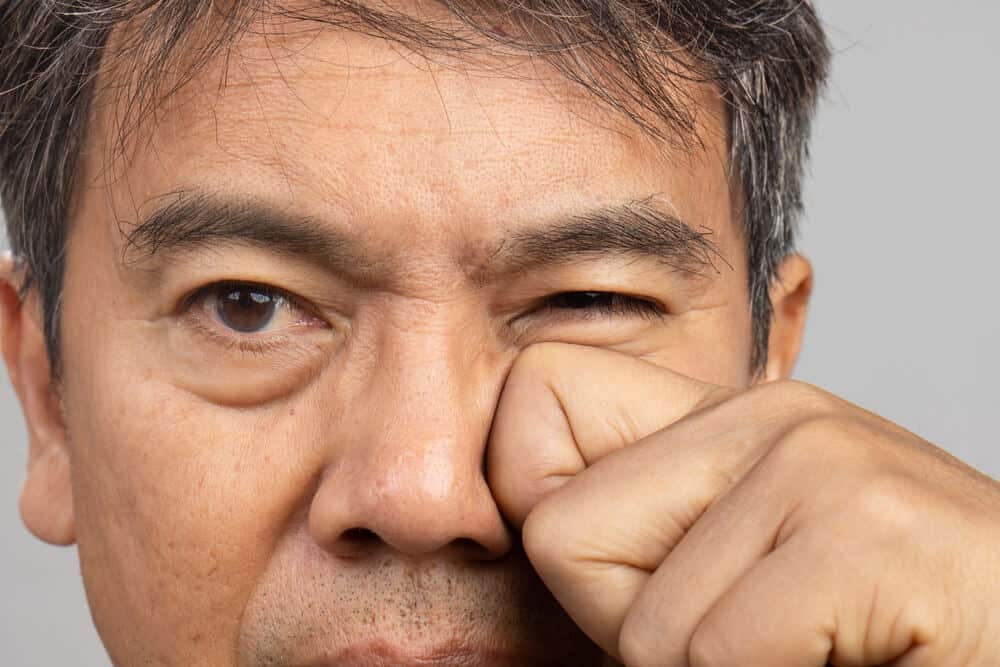rienced a sudden, uncontrollable twitch in your eyelid that seems to come out of nowhere? While it may seem like a minor annoyance, eyelid twitching—also known as eyelid spasm—can be both puzzling and irritating. Understanding why your eyelid is twitching, along with effective treatments and prevention strategies, can help you manage this condition and maintain your well-being.
What Causes Eyelid Twitching?
Eyelid twitching can be triggered by several factors, ranging from stress to underlying health issues. Here are some common causes:
Stress and Fatigue
One of the most frequent causes of eyelid twitching is stress. When you’re under pressure or experiencing high levels of anxiety, your body can react in various ways, including muscle spasms around your eyes. Similarly, lack of sleep or extreme fatigue can contribute to these involuntary movements.
Caffeine and Alcohol Consumption
Excessive intake of caffeine and alcohol can lead to muscle twitching, including in the eyelids. Both substances can act as stimulants, causing your muscles to contract more than usual.
Eye Strain
Extended periods of reading, working on a computer, or using digital devices can cause eye strain. This strain can lead to twitching as the muscles around your eyes become fatigued. If you’ve been staring at a screen for too long, your eyelid may twitch as a sign of overuse.
Dry Eyes
Dry eyes, a common issue for many people, can also cause eyelid twitching. When your eyes are dry or irritated, your eyelid muscles may twitch in response to discomfort or to help spread moisture across the eye’s surface.
Nutritional Imbalances
Deficiencies in certain nutrients, such as magnesium or potassium, can lead to muscle spasms. A balanced diet is crucial for maintaining overall muscle health, including the muscles around your eyes.
Allergies
Allergies can cause irritation and itching in your eyes, which may trigger eyelid twitching. When you rub your eyes frequently due to allergies, it can also increase the likelihood of spasms.
How to Treat Eyelid Twitching
If you’re experiencing eyelid twitching, there are several strategies you can use to alleviate the problem:
Reduce Stress and Get Adequate Rest
Finding ways to manage stress is essential for reducing the frequency of eyelid spasms. Techniques such as meditation, exercise, or talking to a therapist can help. Additionally, ensure you get enough rest each night to reduce fatigue and its effects on your eye muscles.
Limit Caffeine and Alcohol
Cutting back on your caffeine and alcohol consumption can help prevent eyelid twitching. Monitoring your intake and making adjustments can reduce the frequency of these muscle spasms.
Take Breaks from Screens
If eye strain is causing your eyelid to twitch, consider adopting the 20-20-20 rule: every 20 minutes, take a 20-second break and look at something 20 feet away. This practice can help alleviate eye strain and reduce twitching.
Use Artificial Tears
For dry eyes, using over-the-counter artificial tears can provide relief. These drops help lubricate your eyes and reduce the irritation that may be causing the twitching.
Ensure Proper Nutrition
Maintaining a balanced diet rich in essential nutrients can help prevent muscle spasms. Foods high in magnesium and potassium, such as bananas, nuts, and leafy greens, can support muscle function and reduce the likelihood of twitching.
How to Prevent Eyelid Twitching
Preventing eyelid twitching involves addressing the underlying causes and making lifestyle adjustments. Here are some tips:
Manage Stress Effectively
Incorporate stress-reducing activities into your daily routine, such as exercise, relaxation techniques, or hobbies you enjoy. By managing stress, you can reduce the chances of experiencing eyelid spasms.
Maintain Good Eye Health
Regular eye exams can help detect any underlying issues that might contribute to twitching. Additionally, ensuring your vision prescription is up-to-date can prevent unnecessary strain on your eyes.
Stay Hydrated
Drinking plenty of water throughout the day helps maintain proper eye hydration and overall muscle function. Proper hydration can reduce the likelihood of dry eyes and associated twitching.
Avoid Excessive Screen Time
Limit the amount of time spent on digital devices and take regular breaks to prevent eye strain. Implementing the 20-20-20 rule can help keep your eyes comfortable and reduce the risk of twitching.
Address Allergies Promptly
If allergies are causing your eyelid twitching, consider consulting with a healthcare professional to manage your symptoms. Effective allergy management can reduce irritation and the likelihood of spasms.
Conclusion

Eyelid twitching can be a frustrating experience, but understanding its causes and implementing effective treatments can provide relief. By managing stress, addressing eye strain, and maintaining a healthy lifestyle, you can reduce the frequency and severity of eyelid spasms. If you’re concerned about persistent or severe twitching, contact Art of Optiks today to explore further solutions for your eye health.

